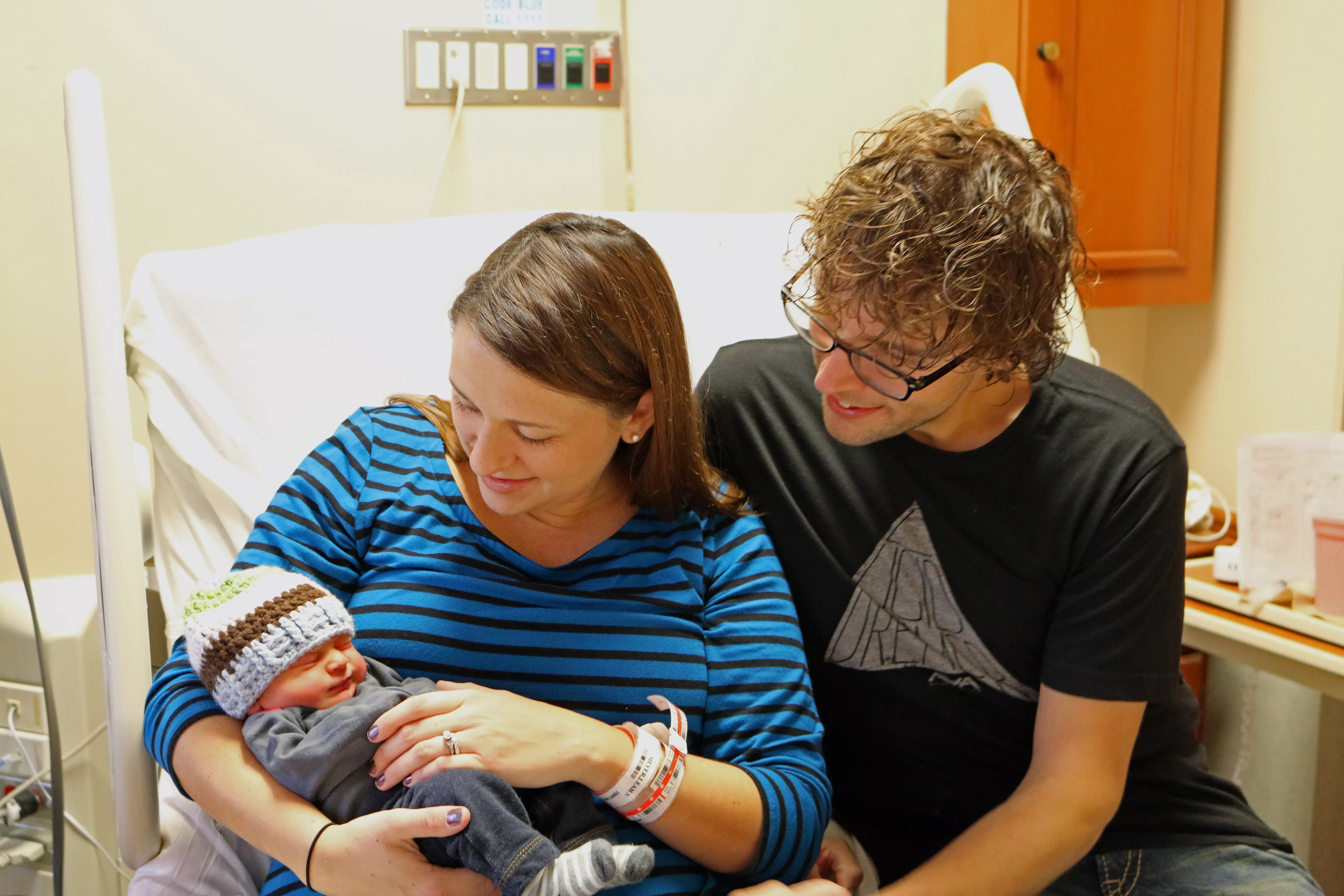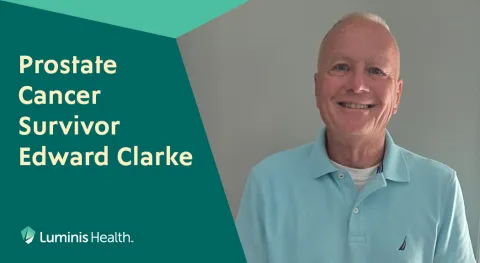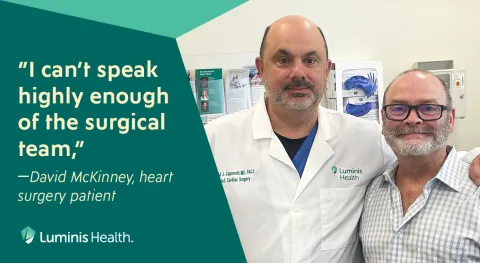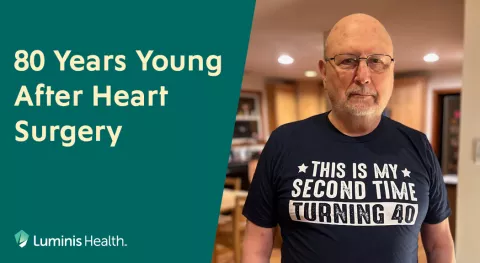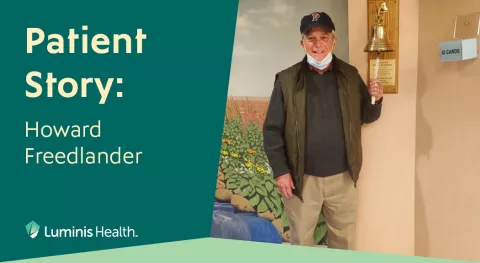An unexpected tragedy
“It was the worst day of my life.” That’s how Greg Meyer remembers Nov. 23, 2012. The night before his wife Leah had her first contraction. She was pregnant with their first child after two years of trying to have a baby. They were one week away from their due date.
With a mix of nerves, excitement and disbelief, Greg and Leah arrived at Anne Arundel Medical Center (AAMC) to deliver their son, Talon. Their nurse began performing a final ultrasound before moving them to the labor and delivery unit. After looking at the machine for a few moments, she told Greg and Leah she needed to get the doctor. “It was then that something just didn’t feel right,” says Leah. “When the doctor came in, he told us the most gut-wrenching news we had ever heard: ‘Your baby doesn’t have a heartbeat.’”
Leah describes the rest of the day as a blur. “From that moment on, we were physically present, but our minds weren’t fully aware of what was happening.”
At 3:05pm that day, Leah delivered their stillborn son, Talon. “He was 5 pounds, .05 ounces and 19 inches long. He had a head full of dark hair like me, and long fingers and toes like his dad. We had no idea what we were doing … never in a million years did we think we would have to welcome our son into the world and say goodbye to him on the same day,” says Leah.
The nurses encouraged Greg and Leah to take pictures and imprints of Talon’s hands and feet, dress him and cut a lock of his hair to keep in a memory box. After holding him for a few hours, Greg and Leah said a final goodbye to their newborn son.
AAMC Labor and Delivery Nurse Tina Raab was one of the nurses who cared for Greg and Leah. “It’s a very humbling experience to be with those patients in the darkest moment in their lives,” says Tina. “Giving them tissues, hugging them, holding the mom’s hand when everyone goes to be with the baby … simple acts like that really go a long way in those situations.”
“The little things our nurses did, like giving Leah a hug, meant the most to us,” says Greg. “What was an awful day could have been exponentially worse without their care.”
Silence instead of support
Greg and Leah aren’t alone. Each year at AAMC, roughly 60 couples experience perinatal loss after their first trimester. Perinatal loss is the non-voluntary loss of a baby from conception to 28 days of life. In the U.S., one in four couples will experience perinatal loss. And each year, 26,000 couples have a stillborn baby, a baby that dies in the womb after 20 weeks of pregnancy or later. For these couples, sources of support are difficult to find.
“Perinatal loss is not a comfortable conversation that people want to have,” says Ann O’Sullivan, AAMC’s perinatal loss program coordinator. When someone dies, their loved ones remember them by telling stories and sharing memories. But when a baby dies, people tend to avoid the subject altogether, Ann explains.
“Any family’s biggest fear is that nobody will remember their baby,” says Ann. “Families find different ways to remember their baby: some have birthday parties, some sponsor remembrance events and some plant gardens.”
Greg and Leah went beyond that. While they remember Talon each year by lighting a candle, they have extended their efforts to give back to other people. “They took their grief and turned it completely inside out to help others,” says Tina.
Choosing hope
Left without their son at the beginning of the holiday season, Greg and Leah returned to AAMC weeks later during the holidays to hand out gifts to patients in the pediatric unit. And, for the past two years, they organized a concert to benefit First Candle, a Baltimore-based charity focusing on perinatal loss research. Greg and other local musicians perform, and local sports teams and businesses donate raffle items. The concert, Still Singing, has raised more than $6,000 to date.
“We can choose to be permanently bitter or we can choose to try, in some weird way, to create positive change from this and make Talon’s life meaningful,” says Greg.
For Greg, that choice inspired a career change. Moved by the compassion and care he and his wife received from their nurses, Greg enrolled in nursing school months after he lost his son. He now works in the heart and kidney unit at Children’s National Medical Center in Washington, D.C. “Our stories aren’t the same, but I can make a deeper connection to what [my patients] might be going through, and what their families might need, after losing my son,” says Greg.
“It does get easier”
Nearly three years after losing Talon, Greg and Leah returned to AAMC’s labor and delivery unit. On Oct. 30, 2015, their son Emory was born. “Having Emory in our arms seemed like the fulfillment of a dream many years in the making,” says Greg. “Having a healthy baby is an amazing miracle.”
Marcus Penn, MD, OB-GYN at AAMC, delivered Emory and cared for the Meyers throughout their pregnancy. “Dr. Penn is one of the most compassionate, caring and dedicated doctors I have ever met,” says Leah. “Before we had Emory, he was there for us during two miscarriages and encouraged us not to give up hope.”
In order to be part of Emory’s delivery, both Tina and Dr. Penn stayed at AAMC well after their shifts had ended. “It meant so much to have them there,” says Greg. “It was kind of like a moment of bringing our miracle full circle.”
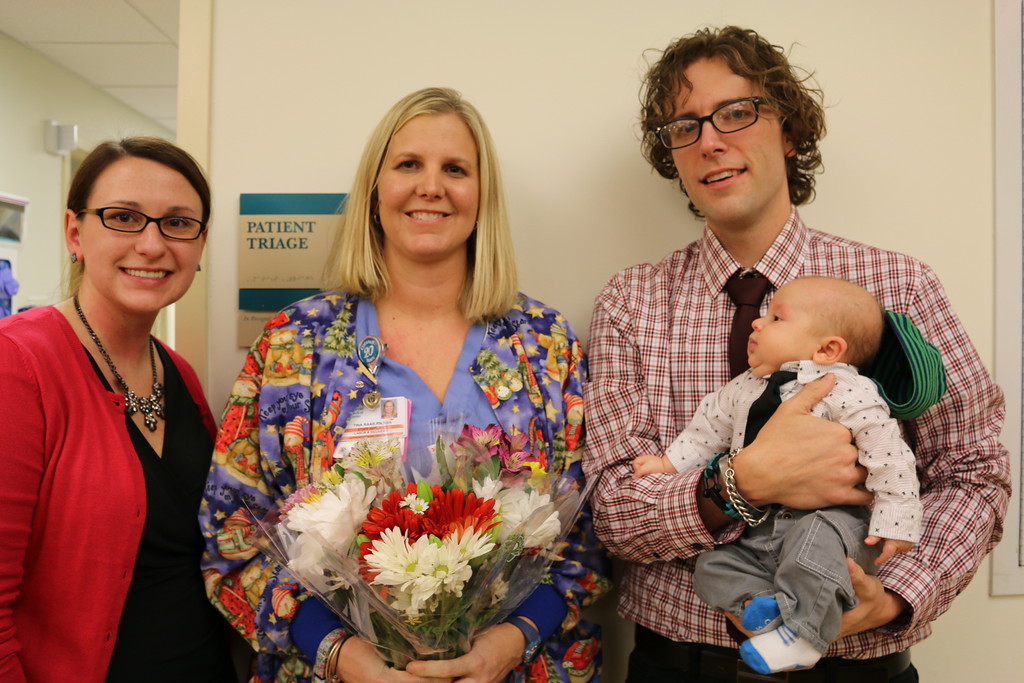
Tina Raab, RN, (center) receives a DAISY Award for excellence in nursing. Leah and Greg Meyer and their son Emory attend the ceremony.
Since Leah’s pregnancy with Emory was considered high-risk, the Meyers also visited a specialist at the Center for Maternal and Fetal Medicine. “Couples who have experienced a loss are often extremely nervous in subsequent pregnancies,” says William Sweeney, MD, director of maternal-fetal medicine at AAMC. “To provide peace of mind and ensure normal fetal health, we schedule frequent visits and fetal tests. We try to respond quickly to any parental concerns to ensure couples are at ease throughout their entire pregnancy.”
While Greg and Leah celebrate their healthy pregnancy and newborn son, they will always remember Talon and continue to bring meaning to his life. “He’s our guardian angel now,” says Greg. “We won’t ever forget, but it does get easier.”
“There is hope for families that are out there grieving,” says Ann. “We do offer perinatal loss support, and it’s important for people to be aware of that. No one has to go through this alone.”
For more information about AAMC’s perinatal loss support services, contact Ann O’Sullivan, perinatal loss program coordinator at 410-570-2164.
Visit www.aahs.org/birth for more information about AAMC’s birth and baby services.
Read about our perinatal loss program in The Wall Street Journal.
Contributors
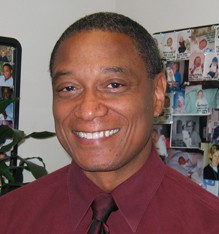 Marcus Penn, MD, is an OB-GYN at AAMC and can be reached at 410-571-9700.
Marcus Penn, MD, is an OB-GYN at AAMC and can be reached at 410-571-9700.
 William Sweeney, MD, is the director of maternal-fetal medicine at AAMC and can be reached at 410-224-4442.
William Sweeney, MD, is the director of maternal-fetal medicine at AAMC and can be reached at 410-224-4442.
